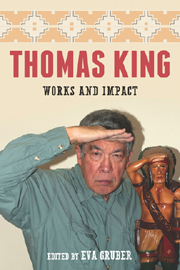Introduction
Published online by Cambridge University Press: 05 February 2013
Summary
Mapping the Terrain
Thomas King is among the best-known contemporary Native writers in North America. In the generation that followed the first wave of Native American Renaissance authors such as Leslie Marmon Silko and N. Scott Momaday, King, along with Sherman Alexie, Louise Erdrich, and Louis Owens, is a leading voice. Through frequent public appearances at festivals, on radio shows, and most recently in the political arena, he is a highly visible personality on the literary landscape, and the sustained quality of his work has been appreciated not least through the numerous prizes and honors he has been awarded or nominated for. King was twice short-listed for the prestigious Governor General's Literary Award (for A Coyote Columbus Story in 1992 and for Green Grass, Running Water in 1993), and he received the Canadian Authors' Award for fiction for Green Grass, Running Water as well as the best novel award from the Writers' Guild of Alberta and the P.E.N./Josephine Miles Award for Medicine River, which was also a runner-up for the Commonwealth Writer's Prize. King's film script for Medicine River won the Best Screenplay Award at the American Indian Film Festival, and his radio show, The Dead Dog Café Comedy Hour, earned him the Aboriginal Media Arts Award. He was awarded the Ontario Trillium Book Award for English Language Prose 2003 for The Truth about Stories and the McNally Robinson Aboriginal Book of the Year Award 2006 for A Short History of Indians in Canada.
- Type
- Chapter
- Information
- Thomas KingWorks and Impact, pp. 1 - 8Publisher: Boydell & BrewerPrint publication year: 2012



